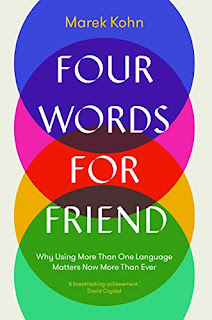Stephanie Jane recenzis Four Words for Friend de Marek Kohn
Interesting and enlightening reading
4 steloj
I have always been fascinated by language, especially the ways in which different languages have diverged but still retain links to each other. I didn't consider my own second language, French, to be fluent enough to claim bilingualism for myself, but Kohn's recognition of the wide variety of ways in bilingualism is vital globally means it would be. I was inspired to pick up a new Book in French right after reading this! Four Words For Friend explores in great depth what it means to be bilingual (or trilingual or quadrilingual) and how societies have always used language as a way to both reach out to other communities, and to close ranks against them, for as long as we've known how to converse.
As someone who actively searches out books in translation I am very aware of how much effort is involved in the task of rendering one culture's idioms …
I have always been fascinated by language, especially the ways in which different languages have diverged but still retain links to each other. I didn't consider my own second language, French, to be fluent enough to claim bilingualism for myself, but Kohn's recognition of the wide variety of ways in bilingualism is vital globally means it would be. I was inspired to pick up a new Book in French right after reading this! Four Words For Friend explores in great depth what it means to be bilingual (or trilingual or quadrilingual) and how societies have always used language as a way to both reach out to other communities, and to close ranks against them, for as long as we've known how to converse.
As someone who actively searches out books in translation I am very aware of how much effort is involved in the task of rendering one culture's idioms into concepts with which someone from a different culture can connect. As Robin Wall Kimmerer noted in Braiding Sweetgrass, a society's use of language demonstrates a lot about their way of life and beliefs. Nuances of meaning are difficult to pin down and I was particularly interested in Kohn's explanations of how everyday bilingual interpretation enhances our brain activity throughout our lives. I've often read novels where characters are speaking in one language whilst listening in another and, as an English woman, being amazed by the concept. Yet for much of the world, this interconnection is perfectly normal and the practice may even go some way towards explaining lower dementia rates in those societies.
I remember being shocked, and a little saddened, some time ago by a fellow reader's statement that they only read books set in English-speaking countries because they hated authors including a smattering of foreign words that they don't understand (and won't google). For me, half the fun of my WorldReads is picking up random vocabulary! I appreciated Kohn's discussions of a number of scientific studies and the difficulties scientists and sociologists encountered in definitively isolating measurable effects of bilingualism. His understanding of the emotional divisiveness of this subject, especially in Brexit England where for years now we have been constantly bombarded with the myth of a certain preferred Englishness, makes for interesting and enlightening reading.

